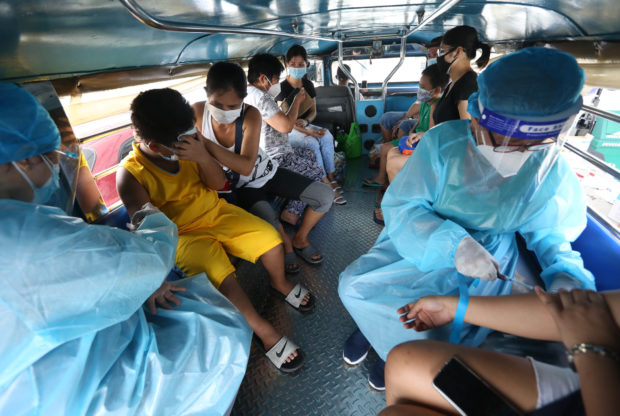Medical groups caution against COVID-19 rapid tests

FREE RAPID TESTS Medical workers examine passengers of a jeepney driving through the Quirino Grandstand testing site in Manila on Monday. —MARIANNE BERMUDEZ
MANILA, Philippines — Medical groups have expressed concern that the continued use of rapid antibody tests is further driving coronavirus infections as the people cleared of the COVID-19 pathogen may in fact be carriers unknowingly spreading the disease.
At least five medical societies have attributed the recent spike in the number of coronavirus infections to the widespread use of rapid antibody test kits, especially by companies that require it as clearance for their employees to be able to return to their jobs.
“[The] continued use of rapid antibody tests for clearance to return to work means that infectious patients are being cleared and may be spreading the disease. On the other hand, patients [who] are being told that they are ‘immune’ may become complacent in the practice of nonpharmaceutical interventions,” the groups said.
MRT 3 case
The medical societies that have raised the alarm are the Philippine College of Physicians, Philippine Society for Microbiology and Infectious Diseases (PSMID), Philippine College of Chest Physicians, Philippine Pediatric Society, and Philippine Society of Public Health Physicians.
In June, the Metro Rail Transit 3 (MRT 3) management subjected all of its depot personnel to rapid antibody testing as a “precautionary measure” after 15 maintenance workers tested positive using the standard RT-PCR (reversed transcription-polymerase chain reaction) test.
That initiative, however, failed to stop transmission of the virus, forcing the management to temporarily shut operations to allow the swab testing of all of its 3,200 workers. In total, 281 MRT 3 workers tested positive.
As early as May, the medical groups, along with the Philippine Medical Association, have warned against the use of rapid antibody testing because its results might create a “false sense of security” and further strain businesses’ and the health-care system’s resources.
Based on available evidence, PSMID said that “there’s no added value” in requiring antibody testing for workers who neither have symptoms nor had direct contact or exposure to someone suspected or confirmed to have COVID-19.
Not looking for SARS-CoV-2
Dr. Issa Alejandria, PSMID president, earlier explained that one of the reasons why her group does not recommend the mass use of both the IgM (immunoglobulin) and IgG (immunoglobulin G) antibody tests available in the market is that “two-thirds” of its results are false positives. This is because the kits do not look for the SARS-CoV-2 virus, the causative agent of COVID-19, but rather the antibodies a person has developed from a current or past infection.
“The available rapid antibody test kits will just tell us whether you have or do not have the antibody. It does not tell you whether that antibody is high enough to be protective or to neutralize the virus,” Alejandria said.
“The test will perform poorly among asymptomatics. The virus belongs to the same family of coronavirus as the common cold. Your results may be a false positive since you have antibodies against the common cold,” she added.
Health Undersecretary Maria Rosario Vergeire pointed out Monday that this was why the Department of Health (DOH) had always maintained that there shouldn’t be mass screening of workers using the rapid antibody test kits.
“We have always emphasized that what this test detects is the antibody, which you only see after so many days if you really have the illness. The caveat is it has been shown, with evidence, that there are many false positive or false negative results with this type of test. That’s why we shouldn’t use it for screening,” Vergeire said.
14-day fitness test
Rather than use the rapid antibody test kits, the medical societies recommended applying the 14-day test to determine if workers are fit to return to work. This test requires workers to be symptom-free for two weeks.
On top of this is the observance of physical distancing, wearing face masks, hand-washing, cough etiquette and daily symptoms screening by a safety officer in the workplace.
On Monday, the DOH reported 1,521 additional coronavirus infections, pushing the national tally to 68,898 cases.
Of the additional cases reported by 62 of the 84 accredited laboratories, 1,209 were patients who tested positive in the last three days, while 312 were confirmed to have the virus four days ago or earlier.
The spread of the virus appeared to be locked in Metro Manila, as the metropolis accounted for more than 80 percent of the additional cases, or 1,237. A far second are Cavite and Laguna, which had 51 cases each, followed by Rizal with 34 and Davao del Sur with 22.
The DOH reported that 607 more patients had recovered, raising the total number of COVID-19 survivors to 23,072. The death toll, however, rose to 1,835, as four more patients succumbed to the severe respiratory disease.
All four died this month. Two of them were from Central Visayas. The two others were from Metro Manila and Davao.
For more news about the novel coronavirus click here.
What you need to know about Coronavirus.
For more information on COVID-19, call the DOH Hotline: (02) 86517800 local 1149/1150.
The Inquirer Foundation supports our healthcare frontliners and is still accepting cash donations to be deposited at Banco de Oro (BDO) current account #007960018860 or donate through PayMaya using this link.